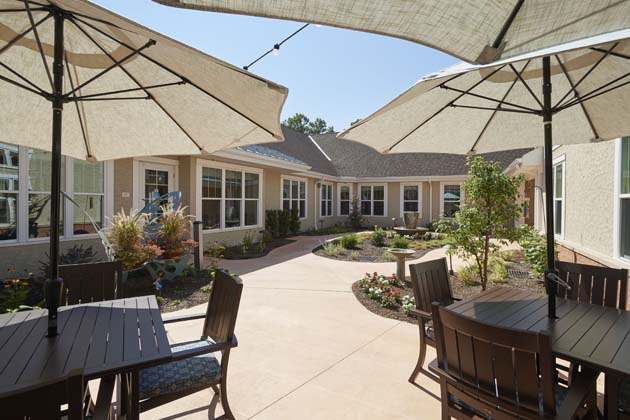Personalized Memory Care Options Focused on Personal Requirements
Personalized Memory Care Options Focused on Personal Requirements
Blog Article
Everything About Memory Care Providers: Why Tiny Memory Care Homes Are a Fantastic Selection
Memory treatment solutions play a crucial role in supporting people with Alzheimer's and dementia. Tiny memory treatment homes attract attention for their personalized approach and intimate setting. With reduced staff-to-resident proportions, these homes cultivate more powerful connections and customized care. Locals benefit from improved social communications and a safe atmosphere. As households explore alternatives, recognizing the distinct advantages of small memory treatment homes becomes important. What variables should be taken into consideration when choosing the right home?
Recognizing Memory Treatment Services
While several may know with general elderly treatment options, understanding memory treatment solutions is crucial for families encountering the difficulties of cognitive decline. Memory treatment specifically deals with individuals with conditions such as Alzheimer's condition and various other kinds of dementia. These solutions offer a structured environment that focuses on boosting the top quality of life for residents with specialized care and support.Memory treatment centers are created to ensure security and safety and security, often including secured environments to avoid roaming. Educated employee are available all the time to aid with day-to-day tasks, medication administration, and individual treatment. Additionally, memory care programs frequently include cognitive excitement tasks, customized to involve residents and advertise psychological health. Family members can benefit from understanding these services, as they allow notified choices concerning their loved ones' care, making certain that their particular needs and choices are addressed in a supportive and compassionate way.
The Benefits of Tiny Memory Treatment Residences
Tiny memory treatment homes use distinct benefits that can greatly improve the lifestyle for citizens with cognitive problems. One substantial advantage is the intimate atmosphere, which allows for individualized interactions amongst personnel and locals. This smaller setup fosters purposeful relationships, lowering sensations of isolation and anxiousness commonly experienced by individuals with memory issues.Additionally, the reduced staff-to-resident proportion in tiny memory treatment homes allows caretakers to give more attentive supervision and support. This approach not only improves safety and security however also advertises a sense of safety and security for the residents.Moreover, tiny memory care homes can adapt rapidly to the special needs and choices of each local, permitting an extra homey ambience. Such a setting can encourage social interaction and involvement in tasks, ultimately enriching the everyday experiences of those living with cognitive impairments.
Personalized Treatment Plans for Locals
Personalized care plans are important in memory treatment homes, as they cater to the special requirements and choices of each citizen. These plans start with comprehensive evaluations conducted by knowledgeable specialists, who assess cognitive capabilities, case history, and personal passions. This customized strategy warranties that care is not just effective but additionally considerate of each individual's self-respect and autonomy.Moreover, personalized care plans are adaptable, allowing modifications as residents' demands develop in time. This adaptability fosters a complacency and experience, which is important for individuals coping with memory difficulties. Caregivers are educated to carry out these plans consistently, offering support that aligns with the citizens' regimens and preferences.Ultimately, individualized care plans boost the lifestyle for homeowners by promoting engagement, independence, and health, making them a fundamental facet of memory care services in little memory treatment homes.
Creating a Home-Like Environment
Creating a home-like environment is important for promoting comfort and familiarity in memory care settings, as it considerably influences citizens' emotional health. Little memory care homes usually prioritize customized touches, such as cozy shade combinations, family images, and familiar furnishings arrangements, which help homeowners really feel a lot more secure. Including components evocative a conventional home, like cozy living rooms and common locations, encourages a feeling of belonging.Moreover, utilizing all-natural light and outdoor rooms can enhance the atmosphere, advertising leisure and harmony. Personnel play a significant function in keeping this environment by engaging with citizens in a caring manner, treating them like household. Routine activities, such as cooking or horticulture, can also add to a home-like feel, supplying chances for homeowners to get involved in purposeful experiences. In general, developing a supporting setting sustains cognitive function and emotional stability, making it a necessary element of memory treatment solutions.
Improved Social Interaction and Community
Boosted social interaction and community are necessary elements of memory care services. By cultivating personalized social engagement and developing a family-like ambience, these services advertise significant connections among locals. Team events and tasks further motivate participation, aiding individuals feel a lot more included and sustained.
Personalized Social Involvement
While social communication is crucial for total wellness, numerous individuals with memory impairments often have a hard time to engage meaningfully with others. Customized social engagement in memory treatment homes addresses this difficulty by producing tailored activities that deal with citizens' unique passions and capacities. By concentrating on private preferences, caretakers can cultivate links that visit their website resonate deeply with everyone. Activities such as art therapy, music sessions, and guided discussions advertise cognitive stimulation and emotional expression. In addition, tiny group setups urge camaraderie and permit even more intimate communications, improving feelings of belonging. This technique not only fights sensations of seclusion but likewise encourages locals to preserve a feeling of identity, inevitably contributing to enhanced psychological wellness and quality of life.
Family-like Environment
In a memory care setting, cultivating a family-like atmosphere substantially improves social communication and develops a sense of area amongst residents. Smaller sized memory care homes often focus on intimate settings, permitting citizens to create closer connections with each other and team member. This nurturing atmosphere advertises trust, which is crucial for people with memory problems. Citizens are more probable to talk and share experiences, producing a helpful network that minimizes sensations of solitude. The familiarity of shared spaces and regimens adds to a feeling of belonging, better encouraging social interaction (personalized memory care). In such settings, emotional bonds grow, bring about enhanced overall well-being and a better of life for locals as they browse their day-to-day experiences with each other
Group Activities and Events

Safety and Safety And Security Features in Little Houses
Many tiny homes made for memory treatment incorporate necessary safety and security and protection attributes to assure the wellness of locals. These homes often make use of safe entry and departure points to avoid roaming, a common problem among people with check this memory problems. Furthermore, surveillance systems and alarm devices enhance surveillance, making certain that team can promptly respond to any kind of unusual activities.Interior designs are tailored for safety and security, with decreased hazards such as clutter-free pathways and sharp edges. Handrails and non-slip floor covering are typically mounted to decrease the danger of drops. Personnel are learnt emergency situation procedures, guaranteeing they are gotten ready for numerous situations.Moreover, individualized care plans might consist of analysis of individual safety and security requirements, supplying tailored solutions for each and every homeowner. Generally, these safety and security and safety and security features develop a nurturing environment where locals can prosper while keeping their dignity and independence.
How to Pick the Right Memory Care Home
Exactly how can family members guarantee they select the most ideal memory treatment home for their loved ones? The decision requires careful consideration of several variables. First, family members should assess the facility's staff credentials and training, guaranteeing that caretakers are experienced in handling memory-related conditions. Next off, it's crucial to evaluate the home's atmosphere, concentrating on security functions and whether it fosters a feeling of community and belonging. Visiting the center can give understanding into daily activities and the social atmosphere, which are crucial for psychological stimulation and emotional well-being. Furthermore, family members ought to ask about the care strategies supplied, guaranteeing they are customized to private requirements. Considering the home's location and accessibility for household gos to can contribute to a smoother shift. By dealing with these elements, families can make an informed decision that prioritizes their enjoyed one's comfort and high quality of life in a memory care setting.
Often Asked Questions
What Certifications Should Personnel Members in Memory Care Houses Have?
Team member in memory care homes must her comment is here have pertinent qualifications, experience in dementia care, strong communication abilities, and empathy. Recurring training in behavior management and therapeutic interventions enhances their ability to sustain homeowners successfully.
Exactly How Do Memory Treatment Provider Differ From Traditional Assisted Living?
Memory care solutions focus particularly on people with memory problems, offering specialized assistance and organized atmospheres. In contrast, conventional assisted living offers basic support with everyday activities, lacking the tailored technique essential for those with cognitive challenges.
What Kinds of Tasks Are Supplied in Memory Treatment Houses?
Memory treatment homes usually use a variety of tasks made to engage residents. Typical choices include art therapy, songs sessions, cognitive video games, physical exercises, horticulture, and get-togethers, all targeted at enhancing well-being and cognitive function.
Can Homeowners Bring Their Own Belongings to Memory Treatment Houses?
Citizens can usually bring their own personal belongings to memory care homes, allowing them to individualize their space - personalized memory care. This practice aids produce an acquainted setting, promoting convenience and a feeling of identification for the people

Just How Are Member Of The Family Associated With the Care Process?
Member of the family play a crucial function in the care process, frequently getting involved in decision-making, participating in care meetings, and giving emotional support. Their participation promotes a collective environment, boosting the local's general well-being and top quality of life. While lots of may be acquainted with basic senior treatment alternatives, comprehending memory treatment solutions is vital for households facing the challenges of cognitive decline. These services provide an organized environment that focuses on enhancing the high quality of life for homeowners through specialized care and support.Memory care facilities are created to guarantee safety and security, often including secured environments to stop roaming. Customized treatment strategies are essential in memory treatment homes, as they provide to the unique demands and preferences of each local. Personnel participants in memory treatment homes should possess pertinent certifications, experience in mental deterioration treatment, solid interaction skills, and compassion. Memory care services focus especially on people with memory problems, supplying specific support and structured atmospheres.
Report this page